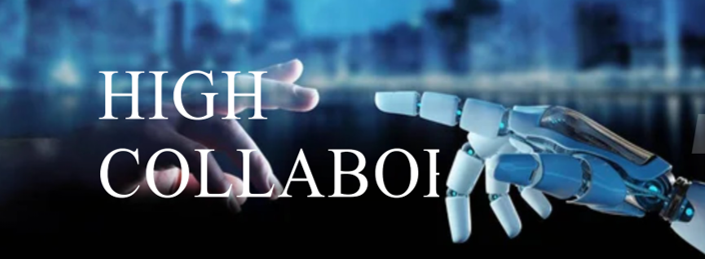
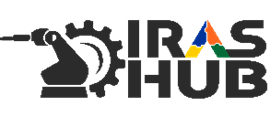
Capacity Building in Robotics & Autonomous Systems in India

Newsletter #1 | October 2023
IRAS-HUB Key message
IRAS-HUB establishes three Hubs in Robotics and Autonomous Systems (RAS) in India to overcome the sparsity of skilled talent in robotics technology. The Hubs are equipped with prototyping equipment and robotics software and will train researchers from Indian Higher Education Institutions (HEIs) in RAS with experts from EU HEIs. It contributes to Indian sustainable economic growth and jobs in industry 4.0. Digital transformation achieved through this project will enable Indian robotics industries to diversify more easily than ever before.
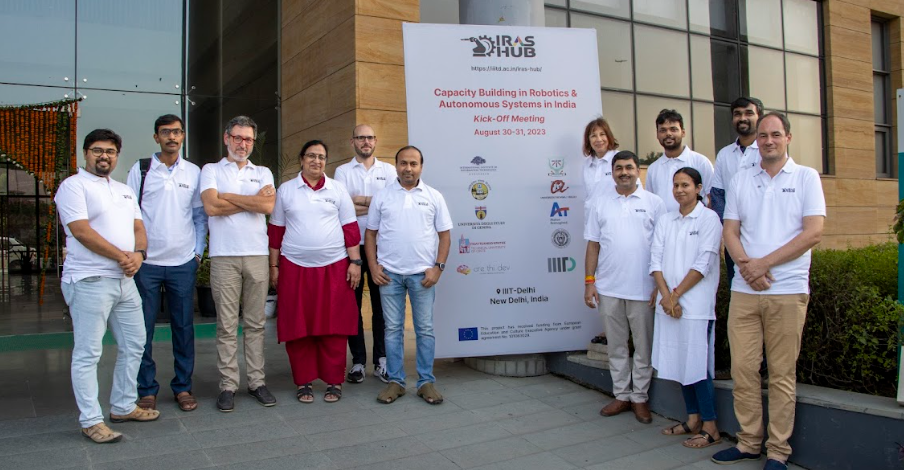
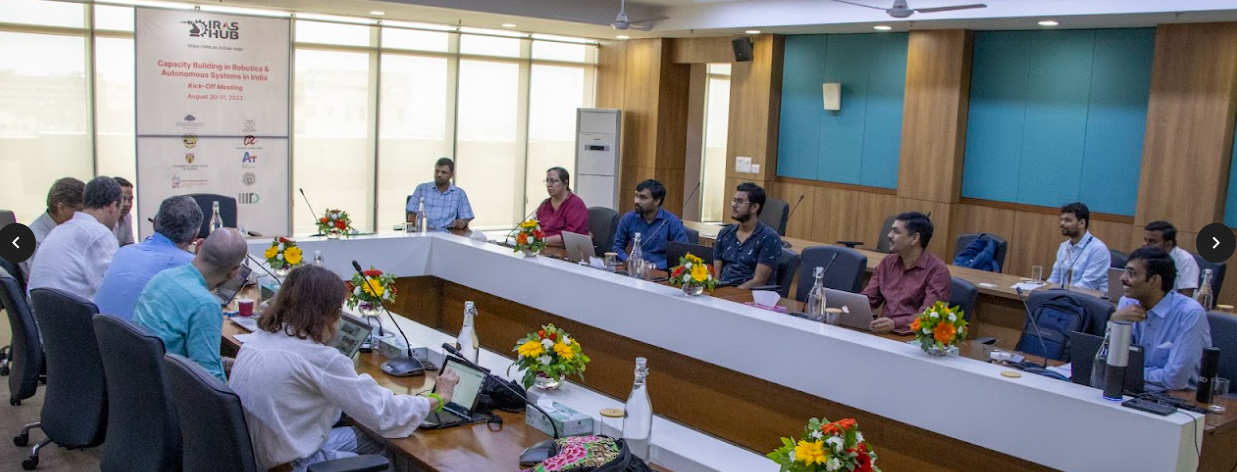
IRAS-HUB Website
The project developed website has been conceived and designed to be functional and easy to use optimized for mobile. It offers quality content, accessible contact and location, clear calls to action, and is optimized for search and social media.
This is URL: https://iiitd.ac.in/iras-hub/
Deliverables performed so far
D1.1 - Management Plan
D1.11 - Tools for Management
D1.2 - Management Meetings Report (1)
D2.1 - Methodology Document: A Roadmap to Capacity Building
D2.2 - Courses and Continued Training Macrostructure & Documentation
D3.1 - Collaboration Platform Specifications & Development Report
D3.2 - Robotics and Autonomous System HUBs equipment and software
D6.1 - Dissemination and Exploitation Plan (1)
D3.2 - Robotics and Autonomous System HUBs equipment and software - Highlights

Some suggested equipment categories include: mobile robots, robotic manipulators, humanoids, inspection robots, industrial workstations, and assisting equipment.
These are images of samples from categories a), b), c), and d).
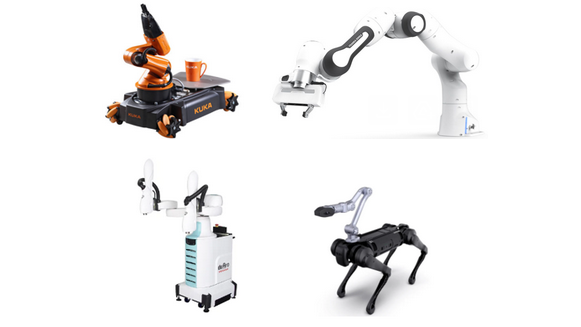
European university URV Prof. Puig visits the Indian HEIs
Professor Domènec Puig, Principal Investigator of the Spanish Universitat Rovira i Virgili’s Intelligent Robotics and Computer Vision Group – IRCV, and leader of IRAS-HUB Work Package 6 Dissemination & Exploitation has visited the Indian HEIs.
 The 22nd, 23rd and 24th of August Prof. Puig has visited the IIIT-Delhi and has held various interviews with the Indian colleagues of the consortium. Among them, he has met with Dr. Shukla, the project coordinator. They have discussed the progression of the first months of the project lifespan as well as set the basis of WP6 structure, mainly by presenting to Dr. Shukla the comprehensive draft of the first version of D6.1.
The 22nd, 23rd and 24th of August Prof. Puig has visited the IIIT-Delhi and has held various interviews with the Indian colleagues of the consortium. Among them, he has met with Dr. Shukla, the project coordinator. They have discussed the progression of the first months of the project lifespan as well as set the basis of WP6 structure, mainly by presenting to Dr. Shukla the comprehensive draft of the first version of D6.1.
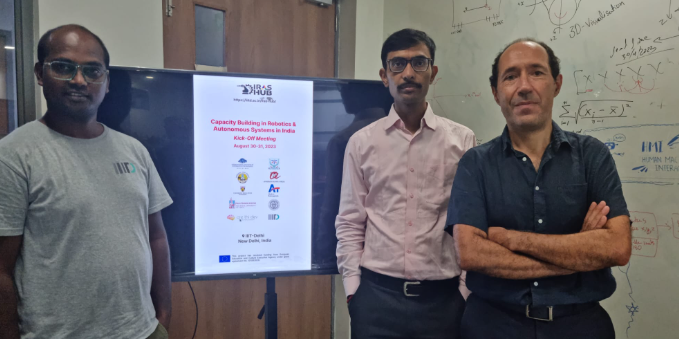
Kick-off meeting
The meeting took place at the Indraprastha Institute of Information Technology Delhi (IIIT-Delhi) on the 30th and 31st of August 2023.
 The coordinator of the IRAS-HUB project, Dr. Jainendra Shukla, who chaired the meeting, serves as an Assistant Professor in the Department of Computer Science and Engineering, jointly affiliated with the Department of Human-Centred Design at IIIT-Delhi.
The coordinator of the IRAS-HUB project, Dr. Jainendra Shukla, who chaired the meeting, serves as an Assistant Professor in the Department of Computer Science and Engineering, jointly affiliated with the Department of Human-Centred Design at IIIT-Delhi.
Read more here.
Partners
Coordinator:
IIIT-Delhi (India)
Indian Partners:
European Partners:
UNIGE (Italy)
WUT (Poland)
URV (Spain)
CRETHIDEV (Greece)
TUC (Greece)
Newsletter Calendar
Contact
Follow us


Capacity Building in Robotics & Autonomous Systems in India

Newsletter #2 | April 2024
IRAS-HUB Key message
IRAS-HUB has established three Robotics and Autonomous Systems (RAS) hubs in India to address the shortage of skilled talent in robotics technology. These hubs are equipped with advanced prototyping tools and robotics software, providing training for researchers from Indian Higher Education Institutions (HEIs) in collaboration with experts from EU HEIs. This initiative supports sustainable economic growth in India and promotes job creation within the Industry 4.0 landscape. Through digital transformation, this project will empower Indian robotics industries to expand and diversify more readily than ever before.
Equipment procurement progress
Within the frame of Task 3.1 Specifications and Equipping the IRAS HUB, of Work Package 3: Development - I: Establishment of RAS Hubs and Training, the three Indian Institutes if Technology are in the process of the procurement of the equipment. The Warsaw University of Technology (WUT) form Poland, as Work Package leader is coordinating the action which must achieve the Milestone 14 of the project: M14 - IRAS-HUBs are equipped. Among other, find examples of the equipment procurement so far.
List of Equipment Purchased so far in IIIT Delhi:
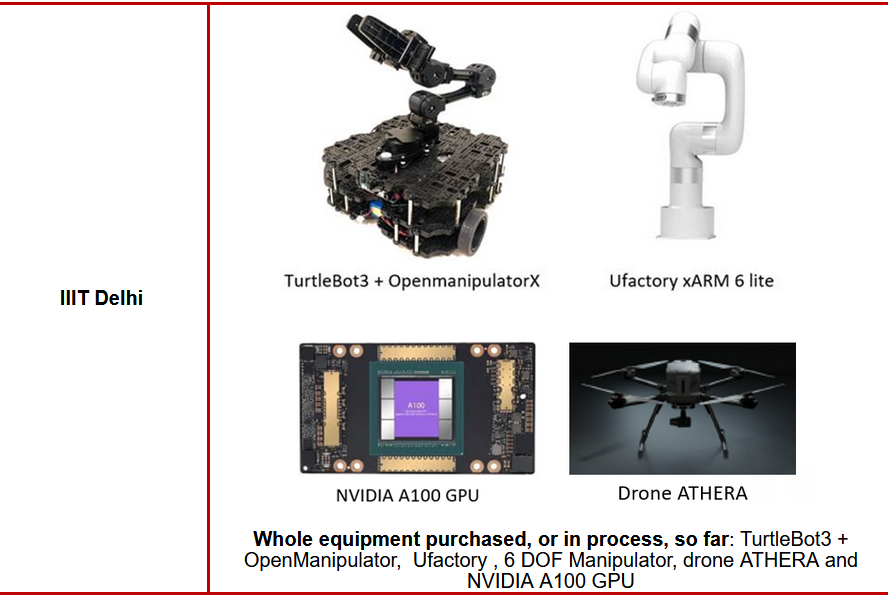
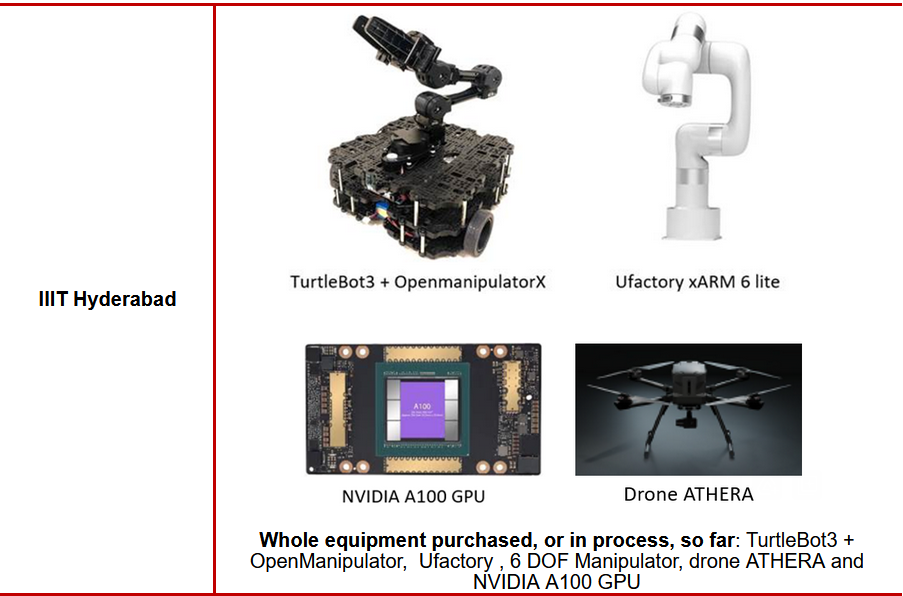

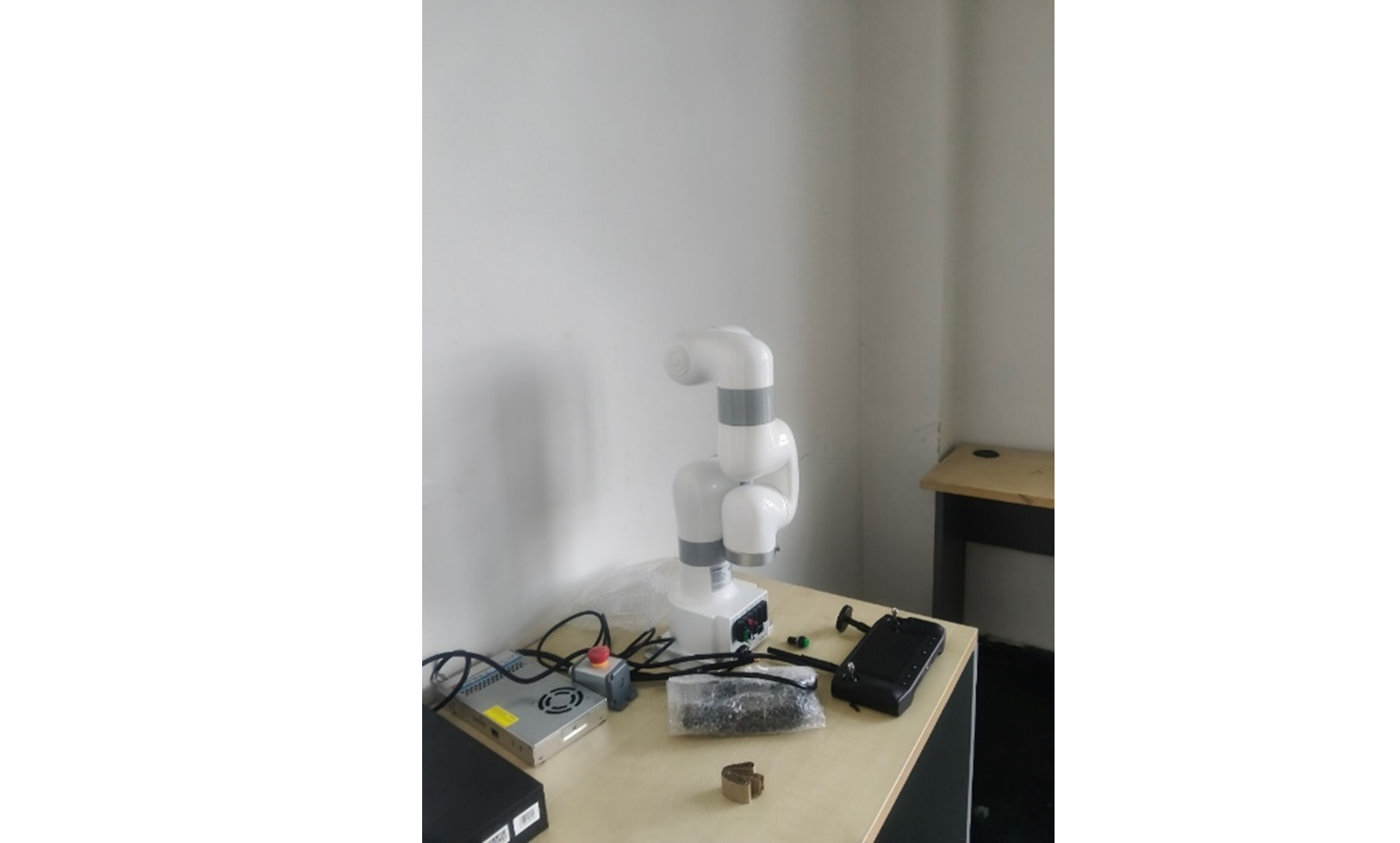
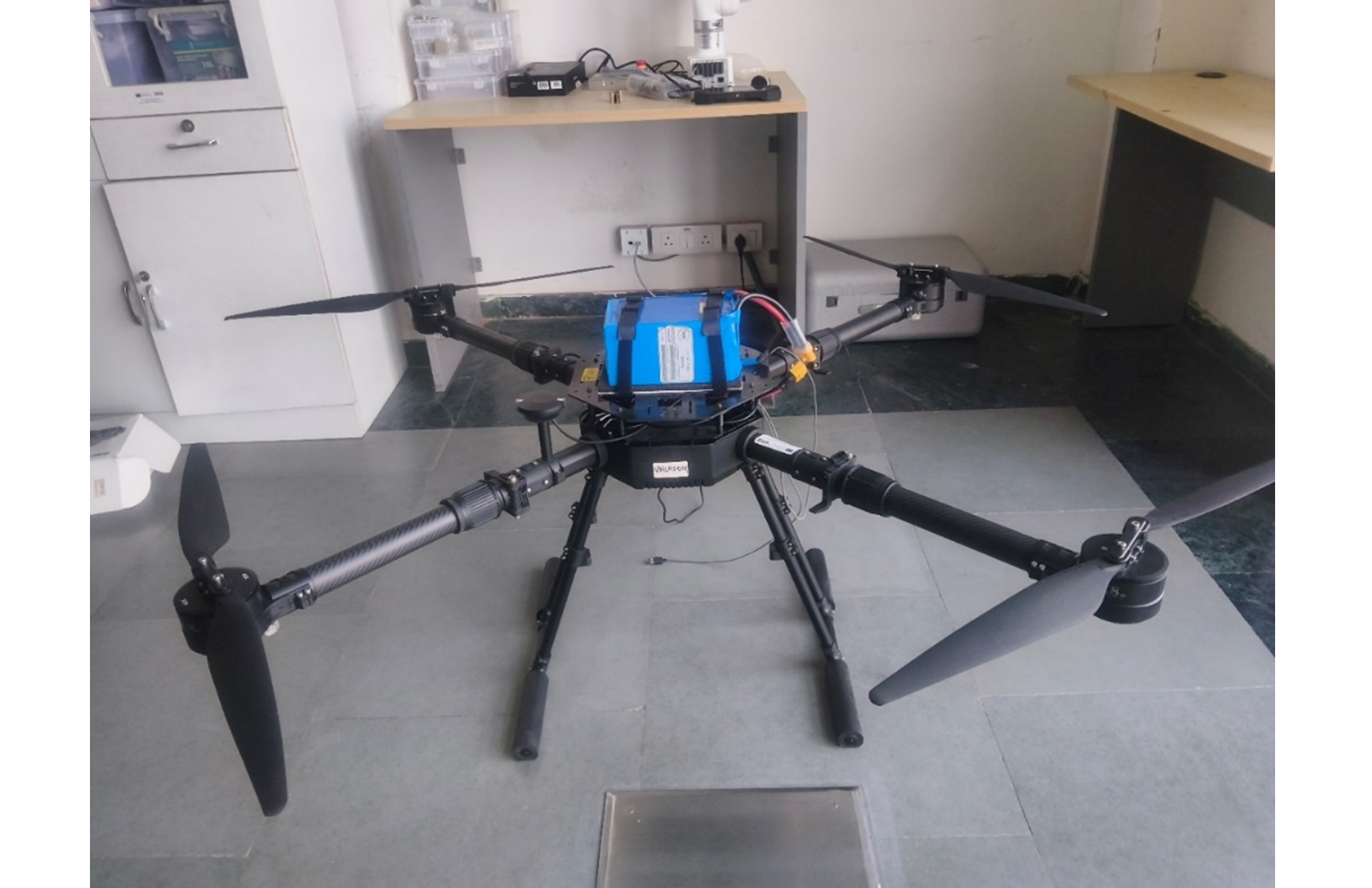
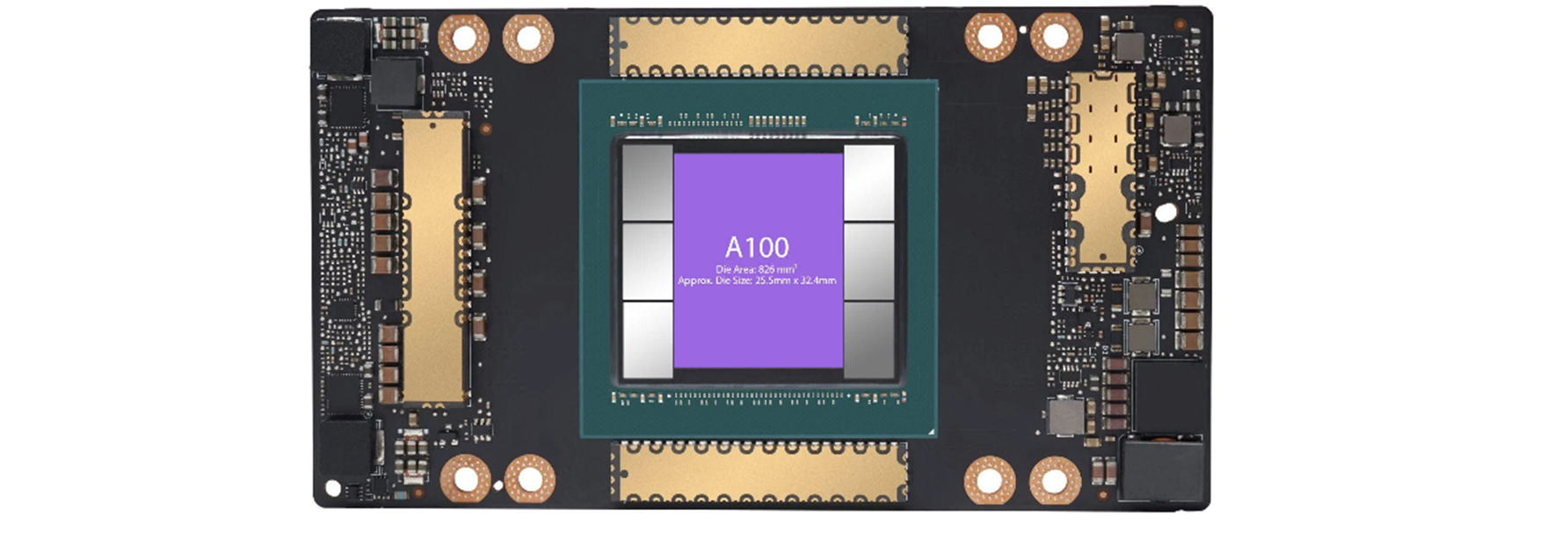
List of Equipment Purchased so far in IIIT Hyderabad:
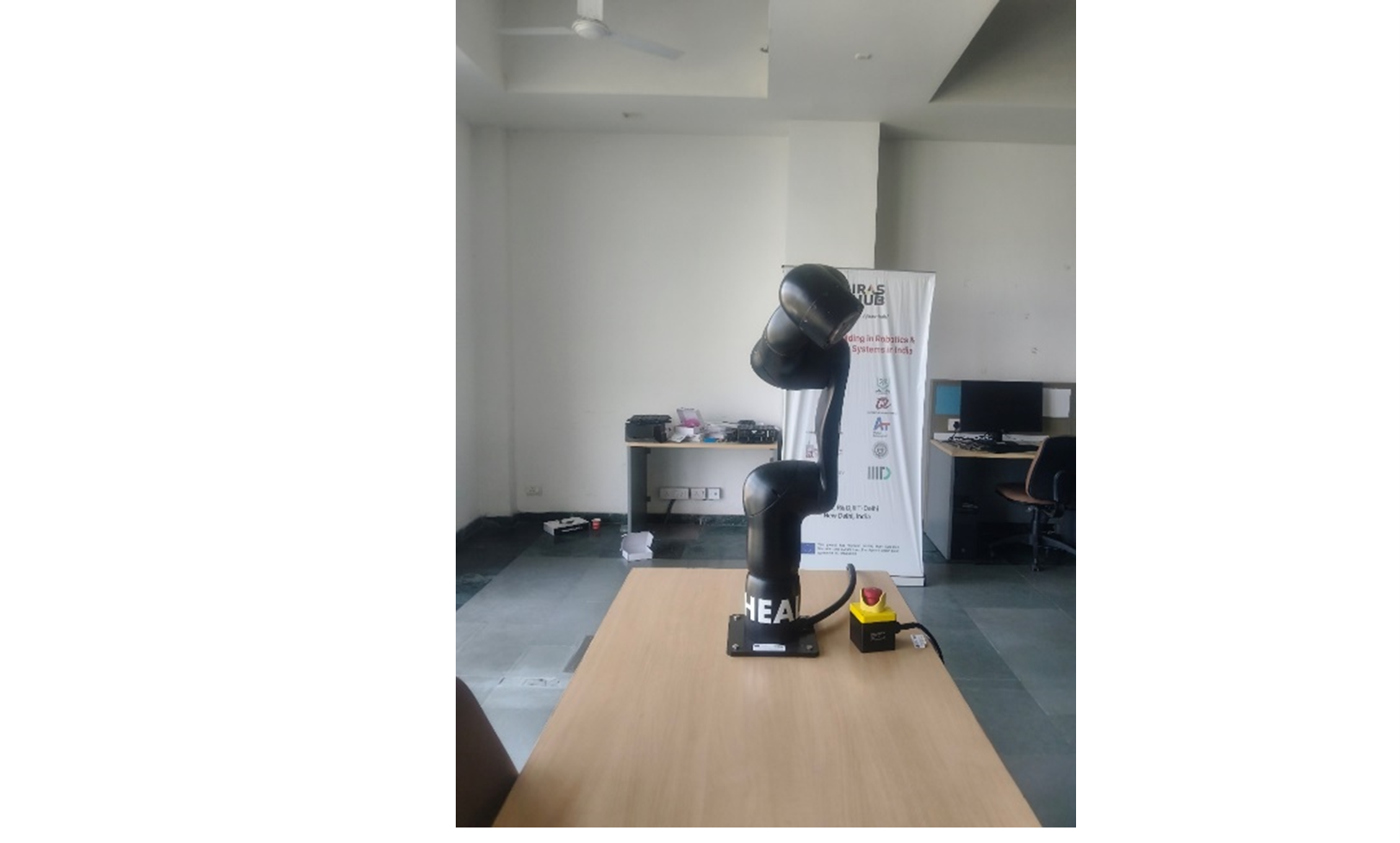
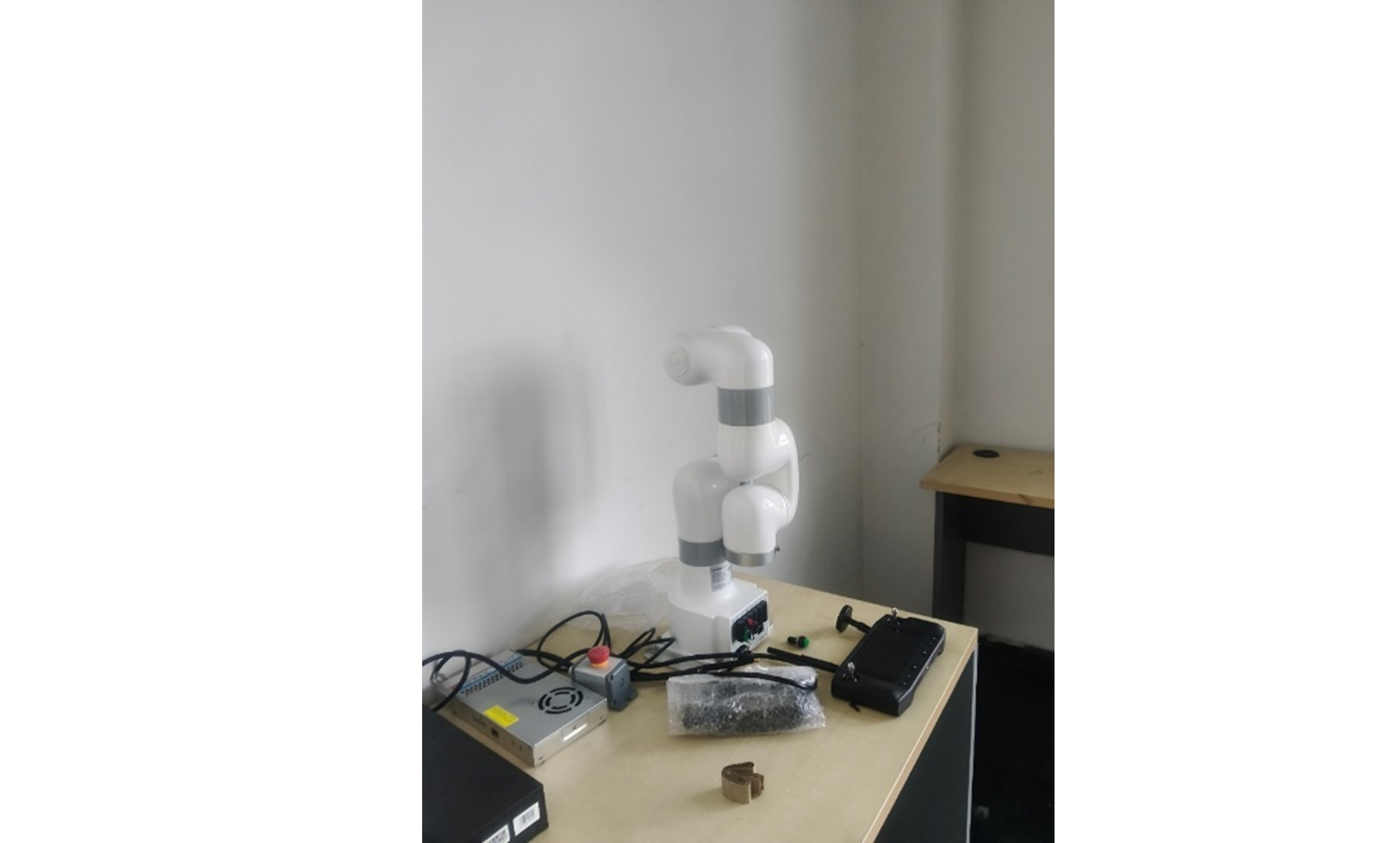
Training activities
The deliverable D3.3 Training Material Documentation for CEP (Continuous Education Programme) is under development. Again, a task carried on by the Work Package 3: Development - I: Establishment of RAS Hubs and Training leader, WUT from Poland.
A five-days training program is specifically designed for the needs of the Indian students, from Monday June 17 to Friday June 21. The lecturing rooms will be located at the Faculty of Electronics and Information Technology, at Warsaw University of Technology Central Campus.
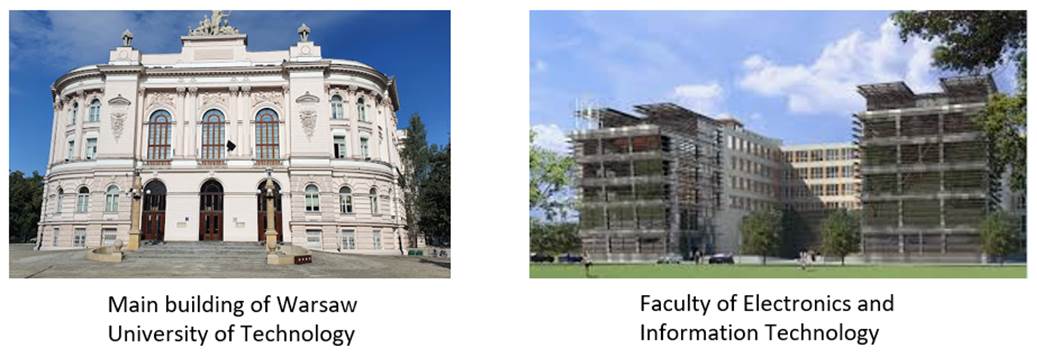
Management handbook
The project coordinator entity, IIIT-Delhi has recently issued a new deliverable, the D1.4 - Project Management Handbook, from the WP1: Project Management and Collaboration. The purpose of it is to provide comprehensive guidance to the partners on the following: 1) Establish Clear Project Governance, 2) Detailed Project Planning, 3) Risk Management, 4) Stakeholder Engagement, 5) Establish quality standards, 6) Monitoring and Reporting, 7) Knowledge Management, and 8) Continuous Improvement.
Dissemination material
In the frame of the WP6. Dissemination and Exploitation, the Rovira i Virgili University (URV), from Spain, has issued a series of 300 leaflets as one of the Objectively Verifiable Indicators of the WP. The leaflets will be delivered to all the partners at the WUT Training sessions in June. Down here both sides of the leaflets:
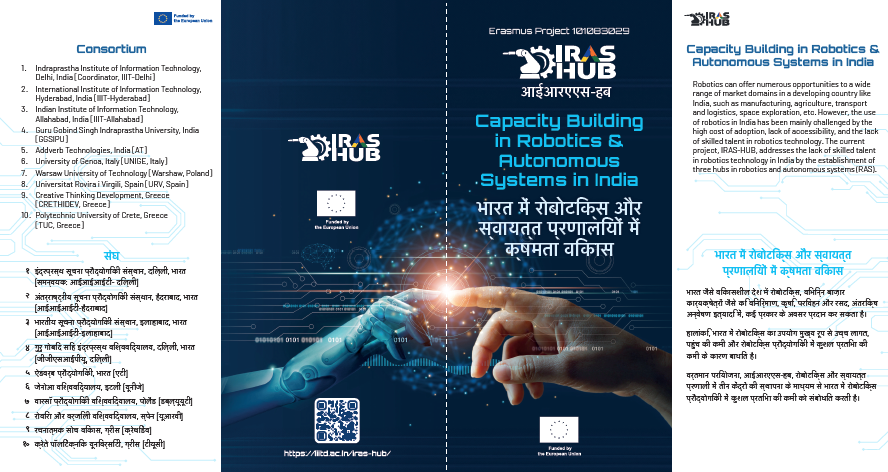
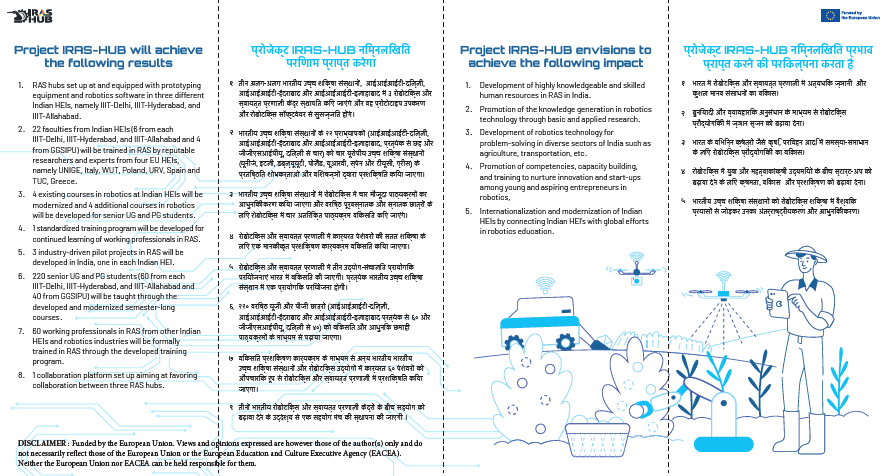


Capacity Building in Robotics & Autonomous Systems in India

Newsletter #3 | October 2024
IRAS-HUB Key message
IRAS-HUB establishes three Hubs in Robotics and Autonomous Systems (RAS) in India to overcome the sparsity of skilled talent in robotics technology. The Hubs are equipped with prototyping equipment and robotics software and will train researchers from Indian Higher Education Institutions (HEIs) in RAS with experts from EU HEIs. It contributes to Indian sustainable economic growth and jobs in industry 4.0. Digital transformation achieved through this project will enable Indian robotics industries to diversify more easily than ever before.
1st Training week. Genoa, Italy / June 10-14, 2024
An immersion trip into robotics for all participants of the IRAS-HUB project was held at the University of Genoa from 10 to 14 June. An exciting four-day adventure into the world of robotics and artificial intelligence.
Trainers: Fulvio Mastrogiovanni and Enrico Simetti (see profiles on the side)
Key Features:
- 1. Expert-led lectures on cutting-edge robotics topics
- 2. Hands-on laboratory experiences
- 3. Networking opportunities with peers and professionals
- 4. A perfect blend of technical learning and cultural exploration
The Programme:
Day 1: Monday - Laying the Foundation- 1. The journey began at 9:00 AM with a warm welcome and introduction by Fulvio Mastrogiovanni and Enrico Simetti in the VB room.
- 2. After a refreshing coffee break, Enrico Simetti guided us through an exclusive tour of the cutting-edge Robotics laboratories.
- 3. The afternoon was dedicated to hands-on experience with Labs & Challenge sessions.
- 1. The day started with an enlightening Lecture 1 on Task Planning in Robotics, delivered by Fulvio Mastrogiovanni.
- 2. Following the mid-morning break, Enrico Simetti delved into Robot Control aspects in Lecture 2.
- 3. The afternoon again provided valuable hands-on experience through Labs & Challenge activities.
- 1. Armando Tacchella kicked off the day with Lecture 3, exploring the fascinating world of Task-Motion Planning.
- 2. After the coffee break, Antonio Camurri presented Lecture 4 on Gesture-Based Robot Control.
- 3. The day concluded with another engaging Labs & Challenge session.
- 1. The morning was dedicated to pitch sessions and wrap-up discussions.
- 2. After lunch, we traded the laboratory for the historic streets of Genoa as Renato Zaccaria led us on a tour of the downtown area.
This comprehensive course combined theoretical knowledge with practical application, all while enjoying the beautiful setting of Genoa. The course will be held in the future for robotics enthusiasts, AI researchers, and students looking to expand their horizons. The course may offer something for everyone.
Some pictures of the week:
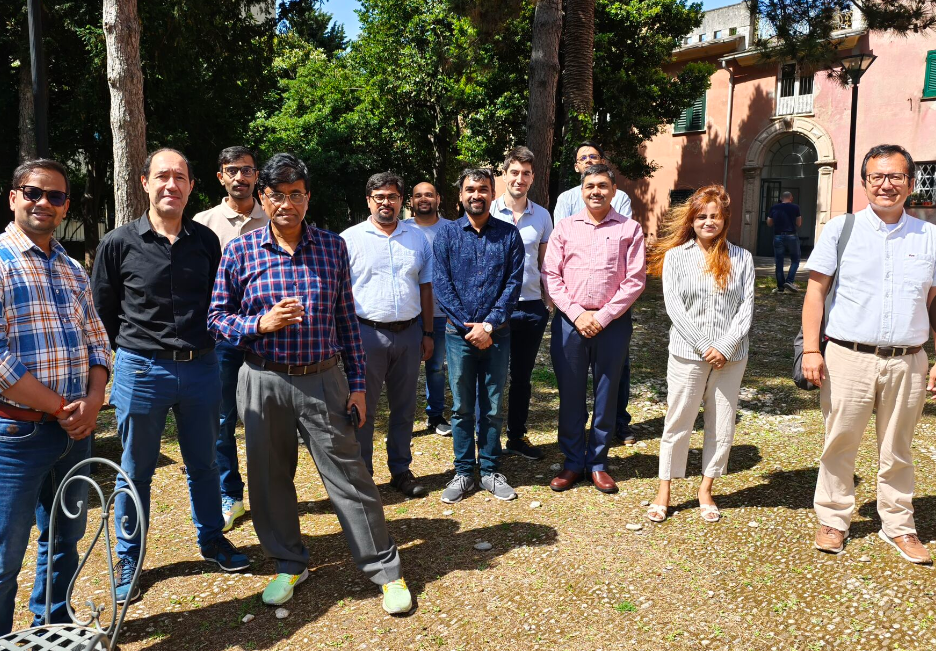
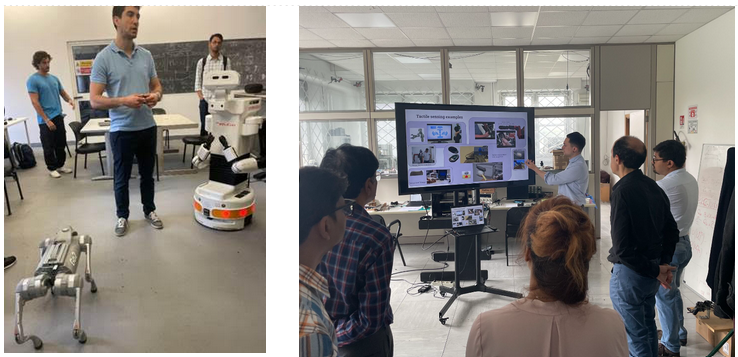
2nd Training week. Warsaw, Poland / June 17-21, 2024
The Indian IRAS-HUB researchers and participants took advantage of their trip to Europe and the project held a second training week in WUT, the Warsaw University of Technology. Hence, the mentioned inmersion trip into robotics for all participants and the adventure into the world of robotics and artificial intelligence continued one more week.
Main Trainers: Teresa Zielińska and Cezary Zieliński (see profiles on the side)
Key Features:
- 1. Expert-led lectures on cutting-edge robotics topics
- 2. Hands-on laboratory experiences
- 3. Networking opportunities with peers and professionals
- 4. A perfect blend of technical learning and cultural exploration
The Programme:
Day 1: Monday, June 17 - Foundation and Robot Programming- 1. 10:00-11:00: Welcome and Introduction.
- 2. 11:00-12:00: Current developmental trends in robotics (TZ).
- 3. 12:00-13:00: Discussion of project progress, considering WP3 and WP4 outcomes and training program.
- 4. 13:00-14:00: Lunch break.
- 5. 14:00-17:00: Preliminaries and introduction to industrial robot programming methods (CZ).
Day 2: Tuesday, June 18 - Industrial Robotics
- 1. Morning: Robotics laboratory introductions and demonstrations (TB).
- 2. 13:00-14:00: Lunch break.
- 3. 14:00-17:00: Industrial robot programming methods (3h) (CZ).
Day 3: Wednesday, June 19 - Agent-Based Systems
- 1. Morning: Agent-based robotic systems (3h) (CZ).
- 2. 13:00-14:00: Lunch break.
- 3. 14:00-17:00: Examples of agent-based robotic systems (3h) (CZ).
Day 4: Thursday, June 20 - Practical Applications
- 1. Morning: Robotic system architectures (2h) (CZ).
- 2. Followed by: Robotics laboratory implementation examples (TB).
- 3. 13:00-14:00: Lunch break.
- 4. 14:00-17:00: Robotics laboratory exercises.
Day 5: Friday, June 21 - Wrap-Up
- 1. Morning activities at Faculty of Power and Aeronautical Engineering robotics laboratories.
- 2. Afternoon: Summary (TZ).
Some pictures of the week:
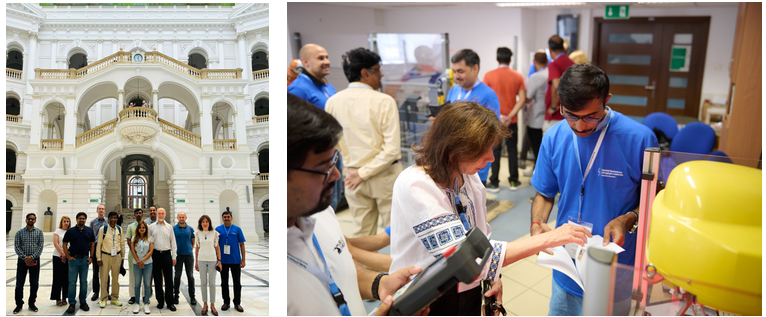
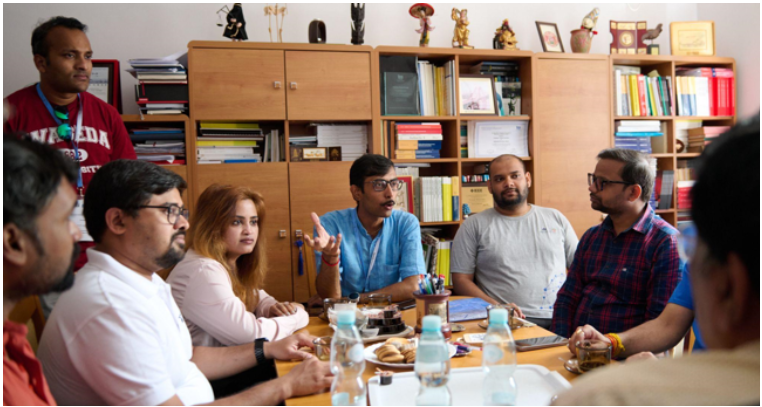
Mid-term talk with Jainendra Shukla, IRAS-HUB Project coordinator
Q: We are now halfway through the IRAS-HUB project. What do you think about the development of the project so far?
A: We're pleased with the progress of the IRAS-HUB project. The establishment of three state-of-the-art hubs at IIIT-Hyderabad, IIIT-Delhi, and IIIT-Allahabad, coupled with the successful training of Indian faculties in Robotics and Autonomous Systems (RAS) at European universities, are significant milestones. The progress of the project has also been recognized by both internal and external evaluators, reinforcing our commitment to fostering innovation and talent in the field of RAS.
Q: Before we address some of the specific objectives (SO) of the project, we would like to hear your thoughts on the main one, which is as follows: To contribute to sustainable economic growth and employment in the Robotics and Autonomous Systems (RAS) Industry 4.0 by building capacity in Indian higher education institutions with the transfer of knowledge in RAS from EU higher education institutions.
A: Our primary objective has been to foster sustainable economic growth and employment in India's RAS. To achieve this, we've focused on building capacity within Indian higher education institutions by transferring knowledge and best practices from our European partners. Throughout the project, we've meticulously observed and analyzed European training methodologies and infrastructure, adapting them to suit the unique needs of the Indian context.
One of the key strategies we've employed has been to learn from the best practices of our European partners. For instance, during the establishment of the IRAS-HUBs, we carefully studied the types of equipment and software they utilized. Similarly, while training Indian faculty at WUT and UNIGE, we closely examined their training methodologies and curriculum. This hands-on approach has allowed us to identify areas where we can enhance our own practices and develop a curriculum that is more aligned with international standards.
We believe that by adopting these best practices and tailoring them to the Indian context, we can equip Indian institutions with the tools and resources necessary to produce highly skilled graduates. This, in turn, will drive innovation and contribute to the growth of India's RAS industry, leading to increased economic prosperity and employment opportunities.
Q: We believe that by adopting these best practices and tailoring them to the Indian context, we can equip Indian institutions with the tools and resources necessary to produce highly skilled graduates. This, in turn, will drive innovation and contribute to the growth of India's RAS industry, leading to increased economic prosperity and employment opportunities?
A: We are satisfied with the progress we've made towards developing highly skilled and knowledgeable human resources through our robotics courses and continuing education program development efforts at the IRAS-HUBs. The enthusiasm and engagement of Indian higher education institutions are clear indicators of our success. These institutions have already begun integrating IRAS-HUB resources into their teaching and research activities, and they eagerly anticipate receiving the final curriculum developed by our partners at URV, Spain and TUC, Greece.
By providing access to state-of-the-art equipment, specialized training, and a collaborative learning environment, we are confident that we are on track to achieve our goal of nurturing a new generation of robotics experts. These highly skilled individuals will play a pivotal role in driving innovation and contributing to the sustainable growth of India's RAS industry.
Q: On the SO: To the development of robotics technology for problem-solving in diverse sectors such as agriculture, health, transportation, etc. Any news or on track development that can led us to think that any innovation is going to be implemented in any of the mentioned sector?
A: While the IRASHUB project is primarily focused on building capacity within Indian higher education institutions, we're actively working towards fostering a culture of innovation that can drive the development of practical robotics solutions.
In the third year of the project, we'll be collaborating with industry partners to identify and implement three mini-projects that focus on specific challenges within these sectors. These projects will provide our students and faculty with valuable hands-on experience in applying robotics technology to real-world problems.
By nurturing a pipeline of talented researchers and engineers, we hope to inspire the creation of innovative robotics solutions that can improve lives and contribute to sustainable development.
Q: A last question on SOs: To the internationalization of Indian HEIs by connecting Indian HEI’s with global efforts in robotics education. What is your opinion on this type of international collaboration projects, are they as useful as thought before the beginning, i.e., when designing the project?
A: We believe that international collaboration projects like IRASHUB are absolutely essential for the internationalization of Indian higher education institutions in the field of RAS. Learning from successful European models in the domain like EMARO and JEMARO programs, has provided us with valuable insights into global best practices and standards.
By connecting Indian HEIs with international partners, we've been able to foster a more interconnected and competitive research environment. This collaboration will not only enhance the quality of our programs but it will also open up new opportunities for our students and faculty to engage with the global robotics community.
Q: To finish the conversation, can you give some advice to other colleagues from Indian, or more broadly, Asian entities that are willing to start such an endeavour? What would you tell them?
A: For those considering similar international collaboration projects, I would emphasize the importance of careful planning and a long-term commitment. Building strong partnerships with international institutions requires trust, open communication, and a shared vision. It's also crucial to invest in capacity-building within your own organization to ensure that you can effectively participate in and benefit from these collaborations.
Additionally, I would advise focusing on areas where there is a clear alignment of interests and expertise. This will help to maximize the impact of the collaboration and ensure that it's sustainable in the long run. Finally, don't be afraid to learn from the experiences of others. By studying successful models like IRASHUB, you can avoid common pitfalls and accelerate your progress.
Finally, I would like to express our sincere gratitude to the European Union for their generous funding through the Capacity Building in Higher Education (CBHE) action. Their support has been instrumental in enabling this project and has facilitated the valuable exchange of knowledge and expertise between our Indian and European partners.
Next activity, more to come
-
 One of the main actions to carry on during the next semester is the
training week to be held in Tarragona, Spain, the so-called Capacity Building Programme by EU HEIs in EU within the IRAS-HUB terminology. The event will count on
several researchers and trainers from the University Rovira i Virgili (URV), as trainers, and 3 Indian HEIs, IIIT-Delhi, IIIT-Hyderabad, and IIIT-Allahabad will be trained using the newly developed and modernized course in Robotics at URV.
One of the main actions to carry on during the next semester is the
training week to be held in Tarragona, Spain, the so-called Capacity Building Programme by EU HEIs in EU within the IRAS-HUB terminology. The event will count on
several researchers and trainers from the University Rovira i Virgili (URV), as trainers, and 3 Indian HEIs, IIIT-Delhi, IIIT-Hyderabad, and IIIT-Allahabad will be trained using the newly developed and modernized course in Robotics at URV.
-
 Preparation and delivery of the
Continued Education Program (CEP) Training toolkit developed by Warsaw University of Technology (WUT), Poland. This planned milestone will indicate the collection and assessment of all training materials by partners.
Preparation and delivery of the
Continued Education Program (CEP) Training toolkit developed by Warsaw University of Technology (WUT), Poland. This planned milestone will indicate the collection and assessment of all training materials by partners.
-
 Delivery of the description of all the
teaching material, including also the software developed for the robot-based training use cases (D4.1). A detailed report about the two training phases in EU and Indian HEIs will be given by the University of Genoa (UNIGE). The Deliverable will also include an account about the activities carried out, staff and trainee feedback, notes, and material, as well as training results and key performance indicators.
Delivery of the description of all the
teaching material, including also the software developed for the robot-based training use cases (D4.1). A detailed report about the two training phases in EU and Indian HEIs will be given by the University of Genoa (UNIGE). The Deliverable will also include an account about the activities carried out, staff and trainee feedback, notes, and material, as well as training results and key performance indicators.
Fulvio Mastrogiovanni
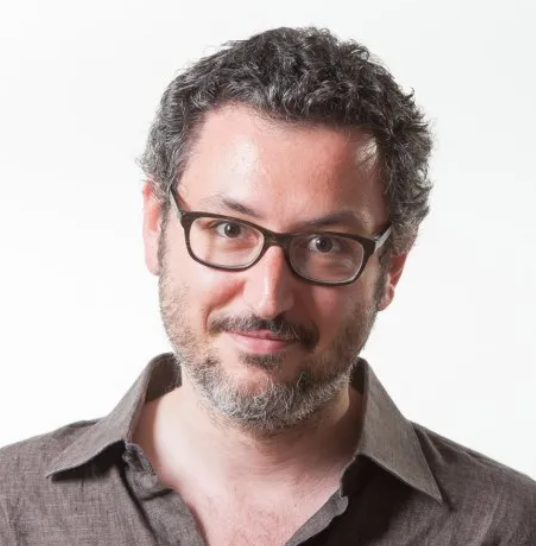
Researcher at the University of Genoa, Associate Professor Affiliated to the Centre for Intelligent Robotics at the Japan Advanced Institute of Science and Technology (JAIST), Japan, and co-founder of the start-up Teseo. At the University of Genoa, teaches Software Architectures for Robotics in the ERASMUS+ European Master on Advanced Robotics (EMARO+) program, part of the master’s degree in Robotics Engineering, part of the bachelor’s degree in Computer Engineering. At the Ecole Centrale de Nantes, France, Fulvio teaches an ad hoc version of SW Architectures for Robotics. Fulvio is responsible for the joint UniGe-JAIST laboratory on “Perception, Knowledge and Behaviour Development for Robots”. Furthermore, Fulvio is the referent of the Robotics and Autonomous Systems curriculum, part of the joint PhD Program in Bioengineering and Robotics between the University of Genoa and the Italian Institute of Technology.
Enrico Simetti

Assistant Professor at the University of Genova. His research interests include control of surface and underwater robotic systems, force and motion control of robot manipulators and cooperation within multi-agent systems.
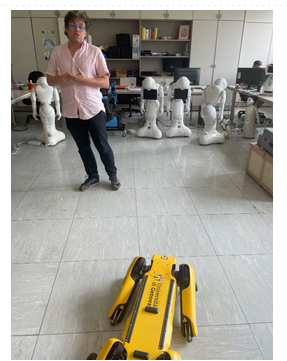
Teresa Zielińska
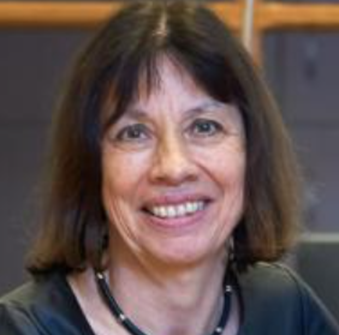
Teresa Zielinska received the Ph.D., D.Sc., and M.Sc. degrees in engineering. She has authored or co-authored over 300 research publications. Her research interests focus on novel robotic systems, walking machines, humanoids, and mobile robots. She has served as the evaluator of research activities at the faculties of Jiaotong University (Shanghai, China) and as a reviewer for several appointments for professor, lecturer, and reader positions in countries such as the UK, Sweden, and Botswana. She has also reviewed doctoral theses in Poland (several), Singapore (several), and Thailand, as well as professorship and promotion applications in Botswana, the UK, and Poland. In addition, she works on real-time control systems and interfacing methods for non-conventional robotic applications. She is the Secretary General of IFToMM and a member of the editorial board of several international journals focused on robotics and mechanics.
Cezary Zieliński
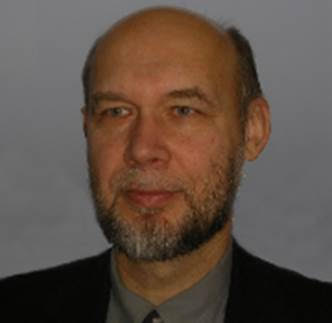
Cezary Zielinski holds M.Sc./Eng. (1982), Ph.D. (1988), and D.Sc. (1996) degrees in control and robotics from Warsaw University of Technology. He is a Professor at WUT's Institute of Control and Computation Engineering, and has held visiting positions at Loughborough University (UK) and Nanyang Technological University (Singapore). He served as vice-Dean at WUT and is currently the Institute Director. Zielinski is an IEEE Senior Member and serves on the Committee for Automatic Control and Robotics of the Polish Academy of Sciences. He leads the Robotics Group at IAIS, focusing on robot manipulators, controllers, and programming methods.
Jainendra Shukla

Dr. Jainendra Shukla, the founder and director of the Human-Machine Interaction
[HMI]
research group at IIIT-Delhi, holds a distinguished Ph.D. with Industrial Doctorate and International Doctorate distinctions from Universitat Rovira i Virgili (URV), Spain.
He is enthusiastic about empowering machines with emotional intelligence and adaptive interaction abilities to improve the quality of life in health and social care.
His research has been disseminated in several venues of international reputation, including CHI, UbiComp, and IEEE Transactions on Affective Computing.
He has co-developed the first-ever MOOC course on Affective Computing for NPTEL.
He also serves as an Associate Editor on the editorial board of IEEE Transactions on Affective Computing.
Currently, as the Principal Investigator, he is leading the European Education and Culture Executive Agency-funded project, Capacity Building in Robotics & Autonomous
Systems in India [IRAS-HUB].
Previously, his research has been supported by the Startup Research Grant (SRG) from SERB, Government of India, and an Industrial Doctorate research grant from the Government of Spain.
His contributions have been widely recognized, including an Honorable Mention at CHI 2024 by SIGCHI, and Distinguished Research, Research Excellence, and Teaching Excellence awards by IIIT-Delhi.
http://jainendra.in/index.html
https://www.iiitd.ac.in/
https://orcid.org/0000-0002-
LinkedIn Jainendra Shukla
Project Partners
Coordinator:
IIIT-Delhi (India)
Indian Partners:
European Partners:
UNIGE (Italy)
WUT (Poland)
URV (Spain)
CRETHIDEV (Greece)
TUC (Greece)
Contact
Follow us




